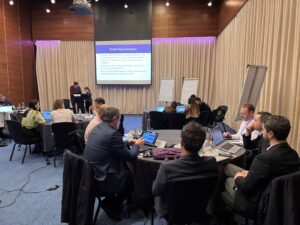
On April 19, the first 20 fellows of the Informatics and Data Science for Health (IDASH) program, part of the U.S. Centers for Disease Control and Prevention-funded Integrated Next-generation Surveillance in Global Health: Translation to Action (INSIGHT) project, successfully completed their fellowship and graduated at a ceremony hosted in Istanbul.
The event included a final in-person workshop and a certificate ceremony, celebrating 12 months of intensive learning and collaboration. The fellowship program included in-person workshops, mentorship, and communities of practice to support applied learning, as well as completion of capstone projects that aligned with respective countries’ health priorities.
“IDASH has been a novel training approach to bridge the gap between public health informatics and data science to improve population health,” says Jennifer Gilvydis, INSIGHT Project Director. “The fellowship is a unique blend of applied learning and supports multidisciplinary workforce development.”
The final workshop covered topics such as evaluating surveillance system performance, public health informatics communication, developing effective poster presentations, and maintaining connections with fellow program graduates. Fellows presented their capstone projects, showcasing the application of newly acquired skills and knowledge.
Each interdisciplinary country team included members from Ministry of Health (MOH) units responsible for digital health and disease surveillance and response, such as mid-senior level epidemiologists, informaticians, data scientists, IT specialists, and public health policy personnel. This diverse mix of disciplines was integral to the fellows’ experience and the success of their capstone projects.
“What was unique [about this fellowship] was that this scholarship included the integration of systems as well as public health and technology,” says Nuraiym Zhumakunova, a fellow and epidemiologist with the Department of Disease Prevention and State Sanitary-Epidemiological Surveillance in Kyrgyzstan. Her team was working on a unified platform for disease surveillance data analysis.
“Overall, [the program] was good because we understood the work as analysts and as IT specialists,” she continues.
Stacey Lissit, Senior Technical Advisor for the IDASH fellowship, agrees that collaboration across disciplines was key to the program’s success: “The fact that IDASH brought together professionals from disciplines that may not typically collaborate and communicate with each other – public health/epidemiologist and IT/Data scientists – was an integral part of the fellowship,” she says. “It enabled fellows to get out of their silos and understand the priorities, needs, and ‘language’ of their colleagues, and see how communication and collaboration are so vital to achieving the desired public health outcomes. The relationships and community that was built among the fellows from different countries was an invaluable component of the program.”
The fellowship not only enriched the participating professionals but also had tangible benefits for their agencies and organizations. “We trained health workers on how to maintain quality data,” said Farhod Akbarov, First Deputy CEO at IT-Med LLC under the MOH of Uzbekistan, whose team was working on reporting, mapping, and forecasting of infectious disease. “These are already new skills for us. We can already filter, sort, and show better quality data.”
As the COVID-19 pandemic has demonstrated, robust information systems that can collect, analyze, interpret, and act on high-quality data are critical to public health. The IDASH fellowship program aims to close knowledge gaps in the global public health workforce, better preparing regions for future health threats.
The fellowship program is set to launch in five countries in South America this June, expanding its reach and impact on global health initiatives.
